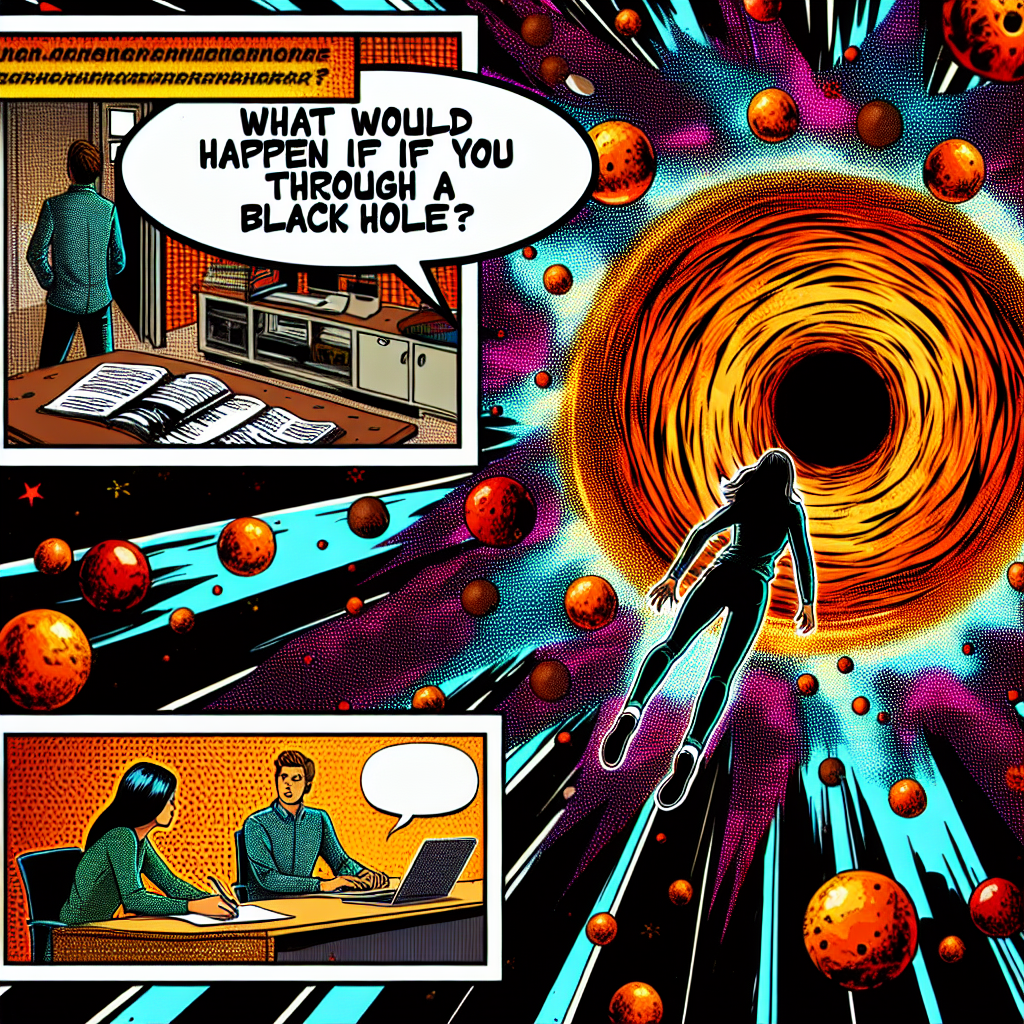As you approach a black hole, the gravity becomes so strong that not even light can escape once you cross the event horizon, a point of no return. Imagine being on a raft, and you're drifting towards a waterfall. Once you go over the edge, there's no paddling back up; you're headed down into the abyss.
The gravity of a black hole warps space-time, making it curve inward, kind of like a sinkhole in the fabric of spacetime. Picture spacetime as a trampoline: place a heavy object, like a bowling ball, on it, and it will warp, creating a curvature. Now imagine that bowling ball is so massive that the curvature becomes a near-vertical slope, making it impossible to climb out.
Now, as you approach the event horizon, you'd start to feel some weird effects. The gravity would start to stretch you in the direction you're moving, like putty in a theoretical astrophysicist's hands. This is called spaghettification, because, well, you'd be stretched out like spaghetti. Not a pretty sight.
Time dilation also kicks in, causing time to slow down near the event horizon. Imagine you're on a train, and your friend is standing on the platform watching you pass by. You both start your clocks at the same time, but because you're moving so fast, time appears to slow down for you relative to your friend on the platform. Now, imagine this effect, but instead of a train, it's the gravity of the black hole warping time itself.
Once you cross the event horizon, you're trapped. The gravity is so strong that even if you were to send a message back to the outside universe, it would be stretched out and distorted, making it unreadable. It's like trying to send a message through a cosmic blender.
The gravity of the black hole would start to heat you up, kind of like a cosmic friction. As you get closer to the singularity, the point of infinite density at the center of the black hole, the gravity would start to tear you apart at the molecular, then atomic, level. It's like being squeezed through a cosmic cheese grater.
Now, let's talk about the singularity itself. This is the point where the laws of physics as we know them break down. The gravity is so strong that our current understanding of physics can't explain what happens at this point. It's like trying to divide by zero – it just doesn't compute.
The experience of passing through a black hole would be... interesting, to say the least. Imagine being squeezed through a tiny, cosmic pinhole, with gravity stretching and compressing you in all directions. The gravity would be so strong that it would create a kind of "gravity lens" around you, bending and warping light in extreme ways.
In reality, you wouldn't survive the journey through a black hole. The gravity would be so strong that it would rip you apart long before you reached the singularity. It's not like you'd be aware of what's happening, either – the gravity would be so intense that your consciousness would likely be torn apart, too.
To put it mildly, black holes are not a suitable destination for any space-faring civilization. They're cosmic monsters, lurking in the darkness, waiting to consume anything that gets too close. But hey, isn't it amazing that we can even try to understand these cosmic behemoths, right from the comfort of our own planet?
The math behind black holes is fascinating, too. The famous equation, R = 2GM/c^2, describes the event horizon of a black hole. It's a beautiful example of how a simple equation can describe such a complex phenomenon. But I digress...
Black holes are a reminder of how much we still have to learn about the universe. They're a tantalizing mystery, a cosmic "what if" that continues to inspire scientists and theorists around the world. Who knows what secrets they still hold, waiting to be unlocked by human ingenuity and curiosity?
In the end, black holes are a humbling reminder of our place in the universe. They're a cosmic showcase of the awe-inspiring power of gravity, and a testament to the ingenuity and curiosity of the human spirit. And who knows? Maybe one day we'll unlock the secrets of these cosmic monsters, and discover new wonders waiting for us in the depths of space-time.

Popular Space Questions
Find answers to the trending space questions being asked by our community on social media.
- How many galaxies are there in the universe?
- How far is Pluto from Earth?
- How many planets are in the Milky Way?
- How many planets are in our solar system?
- What are the planets in order?
- What would happen if a rogue planet entered our solar system?
- How big is the universe?
- How big is the Earth?
- What if we found a way to manipulate gravity?
- How far is the Sun from Earth?